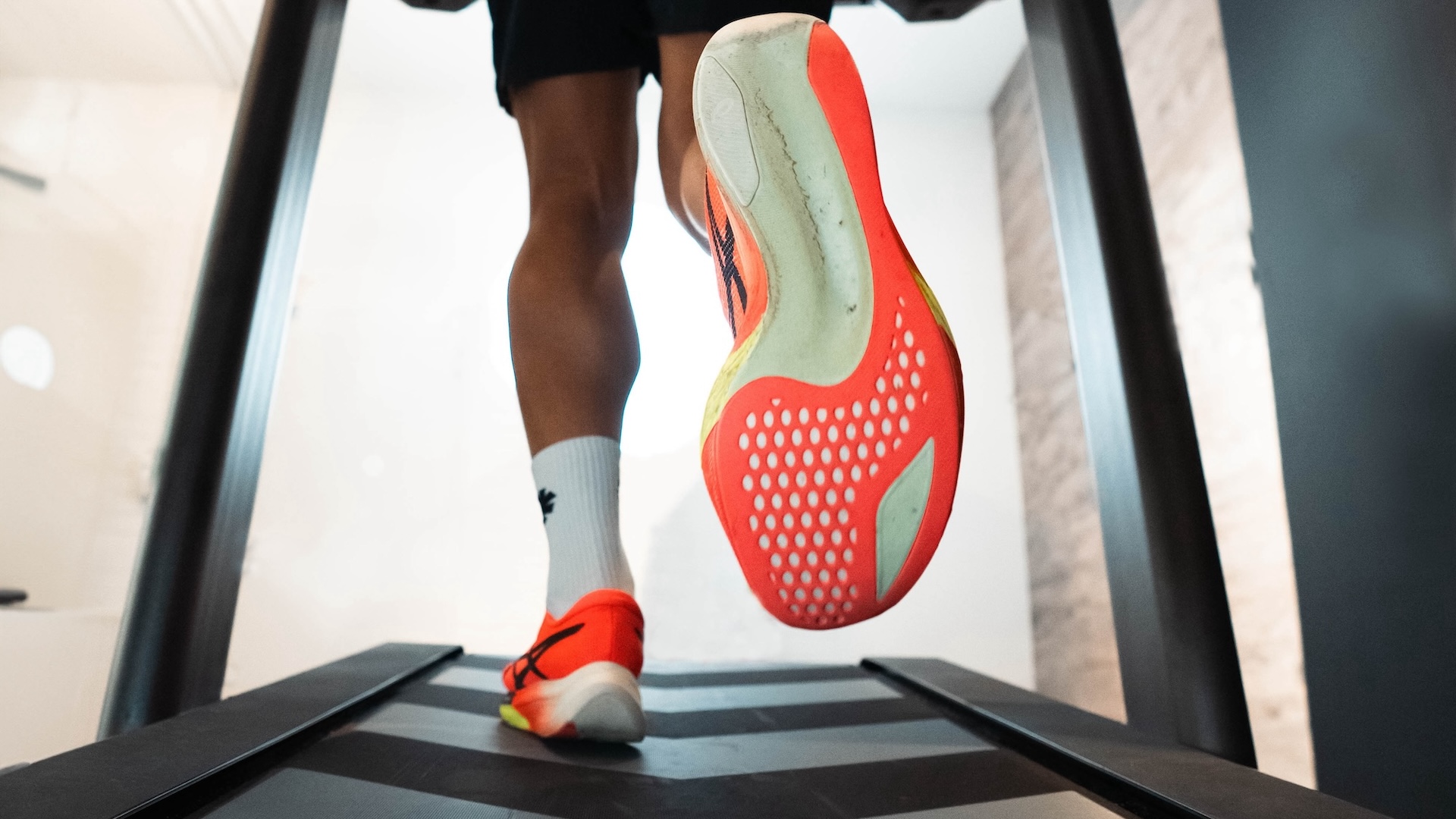How To Run On A Treadmill & The Best Treadmill Workouts For Runners

While many of us would prefer to be running outside, sometimes the better option is to run on a treadmill, whether that’s because of convenience or bad weather.
Here’s why and how to run on a treadmill, and some great treadmill workouts for runners.
WHY SHOULD YOU RUN ON A TREADMILL?
You can use treadmills for easy or recovery runs, you could do long runs on treadmills, you can train for hills on them, and you can do workouts on treadmills, so they are incredibly versatile. And there are lots of other benefits to treadmill running.
- They are in a controlled environment, so you know what the conditions will be like, and this can be a great choice in bad weather or when it’s dark
- You can set your exact pace and percentage grade, and you can stick to those for as long as you want. This means treadmills can be great to help you train to run at a particular speed (if you want to run a 25-minute 5km, then you can set the treadmill to exactly the pace to learn what that feels like), or to hit certain paces during an interval workout. They can also help you run slower if you’re guilty of running too quickly on the roads
- Treadmills can help you run on hills, especially if you live in a flat area. This can be extra useful if you’re training for a hilly race
- Good treadmills reduce the impact on your legs compared to running on the road, so they potentially come with a lower physical load on the body
- You can have fluid, hydration and anything else you might need right in front of you, which is a great way to practise running nutrition but also to make sure you aren’t under-fuelled or dehydrated
- Treadmills can train mental resilience because, let’s be honest, they can be boring to run on. Getting on a treadmill, setting a pace that works for you, and just running for an extended period can help to toughen you mentally. Or if you need some distracting…
- You can watch YouTube or Netflix or TV while running on a treadmill!
HOW DO YOU RUN ON A TREADMILL?
- Get yourself properly set up before you begin, so have your water bottle in the holder, get some towels because you’ll probably sweat more on the treadmill than outside, and set up a screen and headphones if you’re watching something (and try to put it close to eye level so you aren’t staring down too much while you run
- Start out easy or even walking, and gradually increase your speed to a jog and then into a run, treating it as a warm up – don’t just jump on cold and go straight to your full running speed or it’s going to feel very challenging and you may increase your injury risk
- The best way to replicate outdoor running is to set the treadmill to 1% incline, though this is most effective if you’re running faster than 7:15 per mile pace (around 4:30 per km)
- If you find treadmill running really boring, then do a workout. By changing the speed or the gradient every few minutes you can distract yourself by breaking down the time into more manageable chunks
- Treadmill paces can feel faster than running outdoors, and it can take a while to settle into a pace which feels comfortable. Try to run in a relaxed way, increase your cadence, try to be light on your feet, and let the belt help you find a good rhythm (and slow it down if you need to or if the pace feels uncomfortable)
- Avoid jumping on to a treadmill belt which is already moving at a fast pace as it can be difficult to match the speed and may cause injury. It’s safer to start from a static belt and increase the pace gradually
- Know that your watch distance might not perfectly match the treadmill distance – if in doubt, trust the treadmill recording as it knows exactly your pace changes. If you’re doing a workout and want to set your watch to record it or to guide you, then it’s likely more useful going to time rather than distance (so do five minute reps instead of 1km reps, then use the treadmill to get the pace you want for the duration of the interval)
- Try to run in the middle or near the front of the treadmill, and be careful not to run too far to the rear of the belt. If the speed becomes too great, or you need to slow down quickly, then hit the emergency stop button and the belt will come to a controlled stop. You can also grab onto the handrails if you need extra support or become unsteady on the treadmill.
THE BEST TREADMILL WORKOUTS FOR RUNNERS
You can just press go on the treadmill and run for as long as you want, but treadmills can be helpful for running workouts as they let you choose the exact pace and duration of the reps you run. For all of these runs it’s a good idea to spend 5-10 minutes warming up and gradually increasing your pace before starting the proper workout.
TREADMILL PROGRESSION RUN
By increasing your pace after certain distances or time durations, you can progressively get faster. For example, you could start out at an easy jog then every few minutes increase the pace slightly. By doing this, you’ll be surprised at how quick you can end up going (and it feels much more manageable than jumping straight to the fast pace!)
TREADMILL FARTLEK OR OVER-UNDERS
A continuous workout where you’re alternating between faster and slower reps on the treadmill.
It could be a fartlek-style run where you set your easy run pace and then add in blocks of faster running.
Or run some more challenging over-unders. For these you alternate between running a little quicker than race pace and then a little slower. So if you’re training for a 25-minute 5km, then do the overs around 4:45 per km / 7:40 per mile and the unders at 5:15 per km / 8:20 per mile). You can alternate by time or distance, but aim for rep ranges around 3-6 minutes.
TREADMILL TEMPO
After a warm up, set the treadmill to your tempo running pace and just run! Hold this for 15-45 minutes, or break it into 2-3 reps with a slower recovery pace in between. This is a great way to run harder without doing intervals (or needing to worry about changing the belt speed too often).
5-10 x 1km
A classic road or track workout done on the treadmill. After your warm up, run reps at your goal pace, then slow down the belt to a jog or walking pace to recover (1-2 mins). You can use the treadmill distance to know how far you’ve run, or plan the workout into your watch but use time to guide you (so if you’re doing 5:00km pace, then do five minute reps and match the pace on the treadmill).
TREADMILL HILLS
Running treadmill reps on an incline can help build extra strength. Try running at grades from 4-8%, and adjust the pace so that it’s challenging. Try reps of 30 seconds to two minutes, and alternate between uphill and flat intervals. If you’ve got a very hilly trail race, then you can also use the treadmill to practise hiking by setting the treadmill to its maximum grade and walking.
RACE SIMULATION
There are two approaches here. One is to set the treadmill to race pace and hold it, either as a long tempo run or as intervals (i.e. 2 x 15 minutes).
The other approach is to use the treadmill to help follow elevation changes on a race you’re doing. For example, if you’re running the Boston Marathon and want to experience the Newton Hills, you can work out the approximate grade changes and adjust the treadmill to copy them.
12-3-30
This is one of those internet-famous workouts that’s actually pretty good. You set the treadmill to 12% grade and three mile per hour pace, then walk for 30 minutes. It’s a challenging effort and it’s a good way to build leg strength and fitness (for those working in kms, it’d be 5km per hour). If you want to run or increase the effort, then lower the grade and increase the speed.
***
Do you like to run on a treadmill? Do you have a favourite treadmill workout?



























Running News
Ingebrigtsen Stars at World Athletics Indoor Championships 2025 – Plus All The Winners!
Sam Ruthe Is First 15-Year-Old To Run A Four-Minute Mile!
Eliud Kipchoge Will Run The 2025 Sydney Marathon!